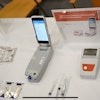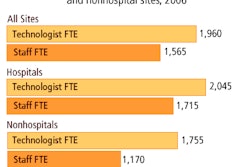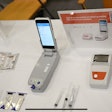
From time to time, radiologists are asked to donate their medical services. They might be asked to interpret films at a mammography screening event, or staff a public clinic. Volunteer activity like this is beneficial for both the patients served and for your facility's reputation. Plus, it probably makes you feel good.
But if you're not careful, donating medical services can lead to problems. The following tips will help keep your facility out of hot water.
Kickbacks
In certain situations, donating your medical services could be considered a kickback. If you ever encounter a situation in which someone wants you to donate free services in return for the referral of paying patients -- in particular, Medicare and Medicaid patients -- you should decline.
Consider the following example: A family practice that sends a large number of patients to your practice sponsors a health fair at a retirement home that offers mammography screenings.
Your radiologist attends the fair to assist in interpreting these screening tests. Neither you nor the family practice will bill Medicare or any other payer for the services performed at the fair, and the family practice won't be compensating your practice or the radiologist for their time.
However, if there's an indication that your radiologist's participation at the fair is part of a quid pro quo -- that is, the participation is in exchange for the family practice's referral of Medicare patients to your practice -- then both your practice and the family practice could be charged with violating the antikickback law.
Make sure malpractice insurance covers you
Physicians are often shocked when, after donating free medical services to a needy patient, that patient turns around and sues them for malpractice -- but it happens. You owe every patient you treat the same duty of care and the benefit of your best medical judgment. And the patient you treated for free has the same right to sue you as any other patient.
Before you agree to donate your medical services, make sure that you have the time and inclination to give these nonpaying patients exactly the same care that you would give your regular patients. Most important, make sure that your malpractice insurance covers these donated medical services.
If you'll be performing the donated medical services in your office or at the hospital where you normally work, and the services are typical of those that you perform in your regular practice, then malpractice coverage shouldn't be an issue.
However, your insurance may not cover your services in certain situations (for example, if you plan to perform the services offsite, such as at a retirement home health fair, or if the services aren't typical of the services you perform in your practice).
Check your policy before you agree to donate medical services to see if limitations might affect your coverage for them. If you think your policy might not cover your services, write your malpractice insurer a letter.
Direct the letter to your practice representative so that it will get attention. (See the sample letter below that you can use in your practice.) Like the sample letter, the letter you send to your malpractice insurer should do the following:
- Identify the sponsor of the volunteer activity.
- Explain exactly what medical services you plan to provide.
- Disclose where and when you'll be performing the medical services.
- Ask the insurer to give you a written verification of coverage and an explanation of any limitations on coverage.
Keep a copy of the letter you send to the insurer in your files. If you don't get a response within about 10 days, call the representative to let them know you're waiting for a response, and send another letter by certified mail with return receipt requested. Be sure to have the insurer's written verification of coverage before you perform any donated medical services.
Sample letter
Here's a letter that you can adapt and send to your malpractice insurer, asking the insurer to verify coverage for your proposed volunteer activity. Direct the letter to your practice representative -- that helps ensure that your letter won't get "lost."
The following sample is excerpted from The Radiology Manager's Handbook: Tools and Best Practices for Business Success, published by HCPro.
[Date]
Re: Policy # A7890
Dear Practice Representative:
Main Street Family Practice is sponsoring a health fair for the residents of the Anytown Retirement Home on Thursday, December 14, 2007. The fair will take place at the retirement home at 123 Willow St. I plan to offer my professional services onsite at the health fair to provide interpretation of osteoporosis screenings and other radiological services.
Kindly send me written verification that my malpractice insurance policy, referenced above, will cover me in the event of a lawsuit arising out of my activities at the health fair. Please include an explanation of any limitation on my coverage.
Thank you for your prompt attention to this matter.
Yours truly,
Roger Rad, M.D.
ABC Radiology
By Kelly Bilodeau
AuntMinnie.com contributing writer
November 20, 2006
The "Mammography Regulation and Reimbursement Report" is a 12-page monthly newsletter designed specifically for mammographic technologists and supervisors that is published by HC Pro. The periodical offers ideas for better practice management from peers, billing tips, MQSA regulatory updates and guidance, and business ideas related to breast imaging. For a free trial subscription, please click here.
Related Reading
New workflow, personnel needed for adopting digital mammography, August 10, 2006
Take care when coding for digital mammography and CAD, July 13, 2006
Easing the pressure of compression for patients, June 27, 2006
Digital mammography: Can your facility afford to make the leap? May 11, 2006
MQSA reauthorization: What to expect and how to prepare, April 13, 2006
Copyright © 2006 HC Pro



















